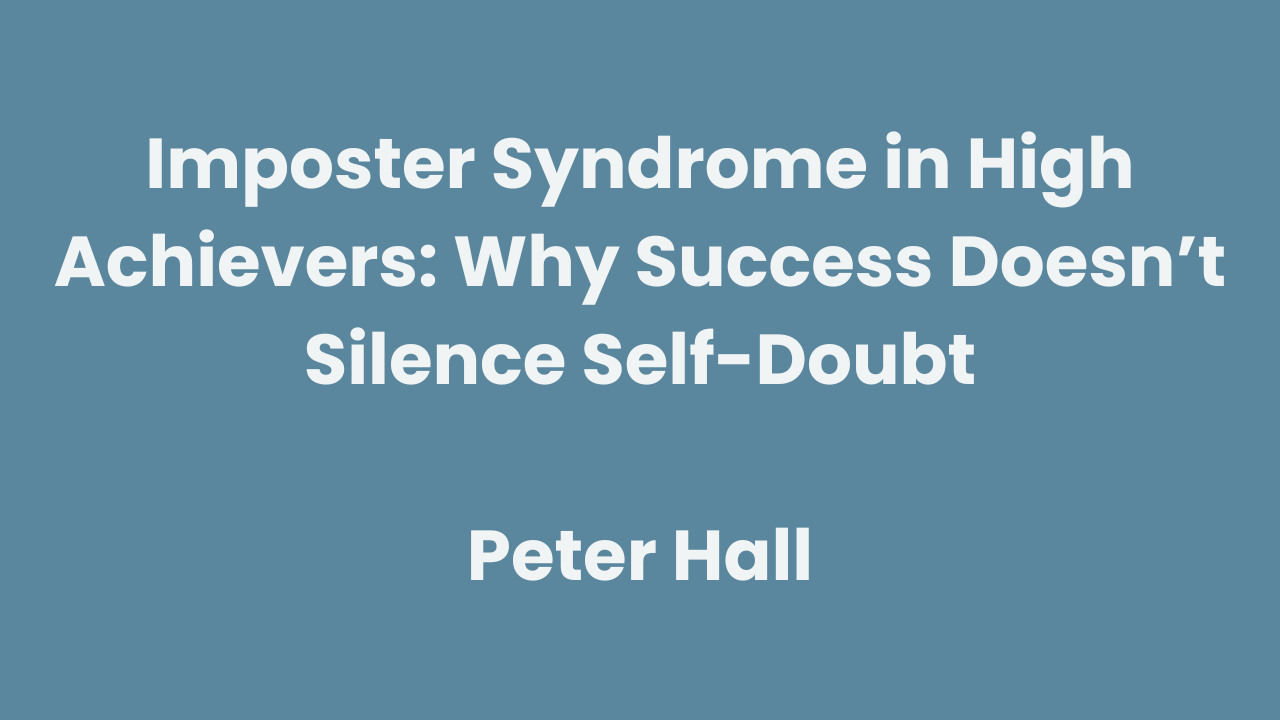Imposter Syndrome in High Achievers: Why Success Doesn’t Silence Self-Doubt
May 18, 2025
Imposter Syndrome in High Achievers: Why Success Doesn’t Silence Self-Doubt
Many high-achieving professionals struggle with imposter syndrome, even after years of success. This post explores why self-doubt often grows with leadership and how to shift your internal narrative for lasting confidence.
Success Doesn’t Silence Self-Doubt
Leadership often comes with a quiet paradox: the higher you rise, the harder it can feel to believe you belong. Success doesn’t always silence self-doubt—in fact, it often amplifies it.
You might assume that as you accumulate achievements, promotions, or titles, the nagging doubt inside you would fade. But imposter syndrome rarely fades with outward success. In fact, for many senior professionals like you—whether you’re an executive, a physician, a partner, or a founder—that internal voice often becomes louder and more persistent.
The Isolation of Leadership
When you reach the top, your environment changes in ways that can feed this doubt. Feedback becomes scarce, indirect, or soaked in politics. Instead of validation, your success is assumed by others, leaving you with little external evidence to counter your self-questioning.
Asking questions can feel risky, like exposing a vulnerability that might confirm your deepest fears. This creates a space where even the most competent people, perhaps yourself included, start to sense a widening gap between how others see you and how you experience your own competence.
Have you ever felt like the last person to believe in your own achievements?
You’re Not Alone in This
Outwardly, you may appear confident, composed, and in control. But inside, you’re constantly calculating your moves, second-guessing your decisions, and managing the ongoing fear of underperforming.
This is not about lacking ability. Rather, it’s the hidden price you pay for living up to standards that often feel impossible to meet—standards that might be invisible or entirely created in your own mind.
Perfectionism Disguised as Discipline
You might avoid labeling what you’re feeling as imposter syndrome, because naming it can make the fear feel more real. Instead, you find yourself saying things like, “I just need to work harder,” or “I’m not doing anything special,” or “I can’t afford to make a mistake.”
Beneath these thoughts lies a persistent belief: that you need to earn your seat every single day or risk losing it.
The Work Is Internal, Not External
Working through these feelings in therapy or coaching doesn’t mean chasing confidence with mantras or mindset hacks. It’s about something deeper. It’s about changing how you measure your own competence and self-worth from the inside out.
This process involves identifying the outdated beliefs that link your value directly to your output, and questioning the idea that doubt means you’re inadequate.
What If You Stopped Asking “Am I Enough?”
You can cultivate a more resilient sense of value—one that does not fluctuate based on your performance or the opinions of others.
The reality is, imposter syndrome is not resolved by achieving more. It eases when you shift your inner framework, when you stop constantly re-evaluating your competence, and when confidence grows from clarity and self-trust instead of perfection.
At a certain point in your journey, the question you face is no longer “Am I enough?” but rather, “What might change if I stopped asking that question altogether?”
Releasing this cycle of doubt can let you experience success with more peace, presence, and authenticity.
Ready to Move Beyond the Cycle of Doubt?
If imposter syndrome is silently shaping how you show up—even at your most successful—you're not alone.
Join the waitlist for The Burnout Reset, my new self-paced course designed for high performers like you who are ready to reclaim confidence, clarity, and peace.